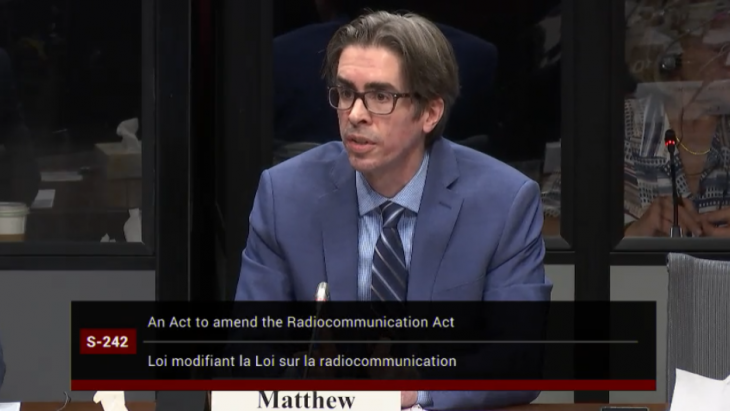
By Ahmad Hathout
OTTAWA – Officials from Innovation Canada pushed back Tuesday against the claim that the current spectrum auction and deployment framework needs a revision to deal with providers that don’t utilize spectrum within a reasonable timeframe.
The Senate transport committee is on second reading of bill S242, which seeks to amend the Radiocommunications Act to require service providers to deploy spectrum and provide service to at least 50% of the population it covers within three years of the licence’s issuance. The idea behind the bill assumes that some service providers are hoarding spectrum and are looking to sell the radiowaves they don’t use at a markup, something the bill’s sponsor colloquially called “spectrum trafficking.”
“ISED’s current deployment conditions for spectrum licence holders is incredibly lax,” Senator Dennis Glen Patterson, who introduced the bill, said during a transport committee hearing this morning. “Proponents are given eight to 10 years to reach targets that vary from jurisdiction to jurisdiction, and the targets are historically built around the population density of urban centres.”
Patterson used the example of Quebecor selling its 700 and 2500 MHz spectrum in 2017 to Shaw for millions in profit.
Patterson also blamed ISED’s set-aside policy – that takes portions of the public resource and auctions them off only to smaller providers – for Canada having some of the highest spectrum costs in the world, as the other providers must bid higher for less available spectrum. That extra cost, he said, then gets downloaded onto customers.
But Matthew Kellison, acting director general of ISED’s spectrum policy branch, who appeared in the hour following Patterson’s testimony, said the bill is “actually less strict than what we’re using now” in some cases.
He noted that, as an example, the 3.5 GHz spectrum requires providers to deploy the spectrum within 90% of that network within five years, 97% within seven years, and 95% of surrounding rural areas within 10 years. He also warned about having a one-size-fits-all approach – that is, the bill’s 50% within three years target – so as to avoid onerous laws that may scare off companies from investing in the spectrum.
“We would have some concerns that we would either have conditions that were not strict enough in some areas or could preclude licensees from using spectrum or wanting to use spectrum in others,” Kellison said, adding these rules also apply to smaller providers that don’t have the advantages like speed of deployment as an incumbent.
Kellison also noted that the proposed bill is “not necessarily going to lead to the outcomes that we would hope for in terms of widespread coverage — it would be too much in some cases, it would be not enough in others; it will also apply to spectrum licences where population coverage doesn’t make a lot of sense,” including satellite licences, backhaul, and spectrum for things that don’t involve population coverage.
Kellison added that ISED has increasingly been modifying its auction rules to make it more likely that spectrum is deployed, including increasingly shortening the deployment time frame closer to five years rather than the eight to 10 and sometimes 20 years it sometimes was. He also said the department is proposing to issue PCS and cellular spectrum licences that are already owned but not in use to providers who want to deploy them.
The Senate bill also includes the ability of the minister to revoke the spectrum licence if it believes the provider is not using it, which Kellison said is already a power the minister has.
“The minister currently has the power to amend, suspend, issue and revoke licenses, has the power to set very broad conditions of licence, whether that be population coverage or whether it’s something else.” Kellison said.
“With respect to tools, I think we would say that the legislative framework we have is sufficient,” he added.
But senators pressed officials on the likely occurrence of a spectrum revocation and how often it actually happens. To that, the officials said it’s “not very frequent.” Since 2015, only three spectrum licences have been revoked, one official said, but he added licences are often voluntarily handed over when providers are told they are noncompliant.
When asked whether the department has revoked any licence in less than three years, an official said no because the deployment requirements would be a period longer than that. When pressed for whether a licence has been revoked within five years of its issuance, the officials could not recall.
“So when Mr. Kellison says that this bill, in some instances, is too rigid, in other instances not rigid enough, that’s not true,” replied Conservative committee chair Leo Housakos.
“Three years is far more rigid than what are the current practices,” Housakos added. “And it’s far more rigid, Mr. Kellison, for a reason, because we like to get things done and we like to get remote regions of the country hooked up.”
The ISED officials also expressed concerns with other parts of the bill, including a provision that requires the department to hold an auction for revoked spectrum within 60 days, which the officials said is too short of a timeframe for a complex process.
The officials were also concerned about a civil liability provision that makes legally liable a holder of revoked spectrum that cannot arrange its transfer to an entity that will use it.
Screenshot of ISED’s Matthew Kellison



